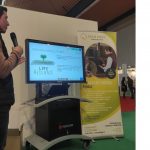 LIFE Resilience, a project co-funded by the LIFE programme of the European Union (EU), whose main objective is the prevention of Xylella fastidiosa in high-density olive and almond farms, has been present at the XXXIV edition of Agroexpo 2022, International Fair for the promotion and development of the agricultural sector.
LIFE Resilience, a project co-funded by the LIFE programme of the European Union (EU), whose main objective is the prevention of Xylella fastidiosa in high-density olive and almond farms, has been present at the XXXIV edition of Agroexpo 2022, International Fair for the promotion and development of the agricultural sector.
The event, which took place from 2 to 5 March in Don Benito (Badajoz), featured one of the project partners, Greenfield Technologies, as a speaker at the conference ‘Drones: a tool for sustainable agriculture’, in which the benefits of the use of drones in the LIFE Resilience project as an ally in precision agriculture were presented.
Jorge Blanco, head of R&D, recalled the relationship between the so-called ‘Green Pact’ and the Common Agricultural Policy (CAP) with precision agriculture to achieve a green recovery after the social and economic crisis caused by the coronavirus pandemic. According to Blanco, «the use of drones in precision agriculture has a lot to contribute to obtaining objective data and being able to make more efficient decisions with the farmer’s resources».
As an example, the innovation expert explained the good practices carried out in the European LIFE Resilience project where, among other tasks and actions, the drone is used to characterise the variability of the treatments carried out in the demonstration farms that the project has in Spain, Italy and Portugal.
In this sense, as set out in the European Green Pact and its strategy «From farm to fork», the aim is to achieve sustainable practices in line with the strategic plans of the CAP, including the protection of biodiversity and adaptation to climate change, through the creation of pathogen-resistant varieties, precision agriculture practices, improving soil fertility or the implementation of plant cover between the planting lines in olive and almond groves.
Thanks to the work with drones, Life Resilience has information on the vegetative development and water stress of the crops which, together with the studies of the variability of the physicochemical and biological properties of the soil and the climatology of the different demonstration farms and replicas of the project, provide valuable spatial and temporal information for the establishment of the methodologies of good cultivation practices that are being investigated to combat Xylella and other pathogens. In this way, the company has carried out drone flights with multispectral and thermal cameras in the farms that are part of the project, as well as the processing of satellite images every 2-3 or 5 days, thanks to the Sentinel 2 missions of the Copernicus programme of the European Commission and the European Space Agency (ESA).
In short, the use of drones in Life Resilience helps our farms to be more competitive and more sustainable, all thanks to a technology capable of greatly improving agronomic knowledge of what is happening and what can happen to crops.
